#story editing
Text
Cut out the boring bits
If you are bored when writing a scene, then chances are, that scene will be boring for readers.
If you find yourself bored, take a step back and analyse why. How can you improve it, and if you can’t, is it necessary for your plot?
#quick writing tips#writers#creative writing#writing#writing community#writers of tumblr#creative writers#writing inspiration#writeblr#writerblr#writing tips#writblr#writers corner#nanowrimo#national novel writing month#nanowrimo 2023#nano 2023#let's write#story editing#editing advice#editing tips#tips for writers#helping writers#plot development
689 notes
·
View notes
Text
self editing tips (first pass)
you want your work to be awesome. i want your work to be awesome. i would love to help you make your work awesome. but sometimes, the first step is doing an initial pass over your draft before passing it off to """""professionals""""" like us. so here are some tips to get that party started...
print your book. you can print it out onto a bunch of sheets of paper and staple them together, or, if you don't mind spending $9 or so, you can get barnes and noble to print it into an actual novel for you! i highly recommend the latter. it helps you view your work as an actual book, not a mess of computer words.
set up the atmosphere. put on some nice ambient music, get yourself a nice coffee or tea or whatever drink you like, light a candle! make your editing workspace feel awesome.
don't change anything during your first pass. this is part of why i recommend printing it! i just want you to take notes, baby. highlight things in different colors if you want. jot down notes if you want. use transparent sticky notes, annotate onto the page, whatever your vibe is. but don't actually change anything right now.
compliment sandwich. after every editing session, write down one thing you think is working from what you read in that session, one thing you want to change or improve, and one more thing you're happy with.
keep a growth mindset, not a fixed mindset. this isn't a bad version that isn't up to your standards and is therefore hopeless. this is a moving part of your book's journey! this is step one. you can't get to step two without acknowledging the value of step one and thanking it for its time.
give yourself breaks to read, listen to music, or watch something with similar vibes to what you're going for. for me, this looks like reading books in the genre i'm writing in, watching shows with characters i really love, listening to music that fits the vibe, or reading poetry about the emotions relevant to my work.
log your progress. maybe write a checklist of every section/chapter so you can check parts off as you finish your first pass. this helps you feel productive, like you're really Doing Something even if you only edited six pages.
second pass tips coming soon! for now, happy writing, and please feel free to send us messages if you have any questions :)
#writing#writing tips#editing tips#self editing#indie author#writers of tumblr#editing block#editing ideas#writing advice#editing advice#self editing tips#story writing#novel editing#story editing#write it#novel writing#writeblr#creative writing#writers block#nanowrimo
1K notes
·
View notes
Text
About Em Dash Press
Hey everyone! I update this blog daily and have weekly new content about writing tips, tricks, and everything in between.
Send me a message if you want writing advice! I'm not currently offering paid editing services, so my inbox is not open to manuscripts.
If you like what you see, please consider using the tip feature on my posts! I run this site for free, but will always appreciate the financial support. 💙
#writing advice#writeblr#writing tips#writers of tumblr#creative writing#writing#writing inspiration#writing community#writing help#writing resources#writeblr blog#writers on tumblr#editing#proofreading#story editing
11 notes
·
View notes
Text
Reading the edit history of any one of my manuscripts:
touches the ground
"Something terrible happened here…"
#creative writing#fiction writing#story editing#writeblr#writer humor#writing memes#writers of tumblr
3 notes
·
View notes
Note
Rowling isn't denying holocaust. She just pointed out that burning of transgender health books is a lie as that form of cosmetic surgery didn't exist. But of course you knew that already, didn't you?
I was thinking I'd probably see one of you! You're wrong :) Let's review the history a bit, shall we?
In this case, what we're talking about is the Institut für Sexualwissenschaft, or in English, The Institute of Sexology. This Institute was founded and headed by a gay Jewish sexologist named Magnus Hirschfeld. It was founded in July of 1919 as the first sexology research clinic in the world, and was run as a private, non-profit clinic. Hirschfeld and the researchers who worked there would give out consultations, medical advice, and even treatments for free to their poorer clientele, as well as give thousands of lectures and build a unique library full of books on gender, sexuality, and eroticism. Of course, being a gay man, Hirschfeld focused a lot on the gay community and proving that homosexuality was natural and could not be "cured".
Hirschfeld was unique in his time because he believed that nobody's gender was either one or the other. Rather, he contended that everyone is a mixture of both male and female, with every individual having their own unique mix of traits.
This leads into the Institute's work with transgender patients. Hirschfeld was actually the one to coin the term "transsexual" in 1923, though this word didn't become popular phrasing until 30 years later when Harry Benjamin began expanding his research (I'll just be shortening it to trans for this brief overview.) For the Institute, their revolutionary work with gay men eventually began to attract other members of the LGBTA+, including of course trans people.
Contrary to what Anon says, sex reassignment surgery was first tested in 1912. It'd already being used on humans throughout Europe during the 1920's by the time a doctor at the Institute named Ludwig Levy-Lenz began performing it on patients in 1931. Hirschfeld was at first opposed, but he came around quickly because it lowered the rate of suicide among their trans patients. Not only was reassignment performed at the Institute, but both facial feminization and facial masculization surgery were also done.
The Institute employed some of these patients, gave them therapy to help with other issues, even gave some of the mentioned surgeries for free to this who could not afford it! They spoke out on their behalf to the public, even getting Berlin police to help them create "transvestite passes" to allow people to dress however they wanted without the threat of being arrested. They worked together to fight the law, including trying to strike down Paragraph 175, which made it illegal to be homosexual. The picture below is from their holiday party, Magnus Hirschfeld being the gentleman on the right with the fabulous mustache. Many of the other people in this photo are transgender.
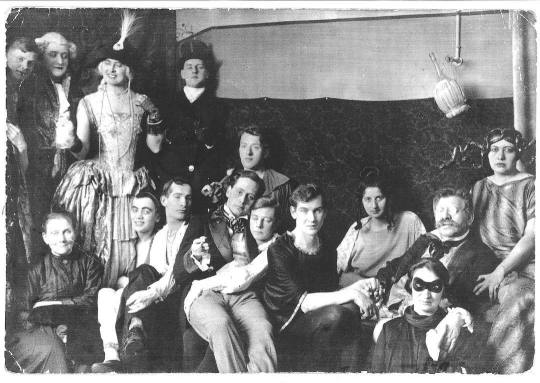
[Image ID: A black and white photo of a group of people. Some are smiling at the camera, others have serious expressions. Either way, they all seem to be happy. On the right side, an older gentleman in glasses- Magnus Hirschfeld- is sitting. He has short hair and a bushy mustache. He is resting one hand on the shoulder of the person in front of him. His other hand is being held by a person to his left. Another person to his right is holding his shoulder.]
There was always push back against the Institute, especially from conservatives who saw all of this as a bad thing. But conservatism can't stop progress without destroying it. They weren't willing to go that far for a good while. It all ended in March of 1933, when a new Chancellor was elected. The Nazis did not like homosexuals for several reasons. Chief among them, we break the boundaries of "normal" society. Shortly after the election, on May 6th, the book burnings began. The Jewish, gay, and obviously liberal Magnus Hirschfeld and his library of boundary-breaking literature was one of the very first targets. Thankfully, Hirschfeld was spared by virtue of being in Paris at the time (he would die in 1935, before the Nazis were able to invade France). His library wasn't so lucky.
This famous picture of the book burnings was taken after the Institute of Sexology had been raided. That's their books. Literature on so much about sexuality, eroticism, and gender, yes including their new work on trans people. This is the trans community's Alexandria. We're incredibly lucky that enough of it survived for Harry Benjamin and everyone who came after him was able to build on the Institute's work.
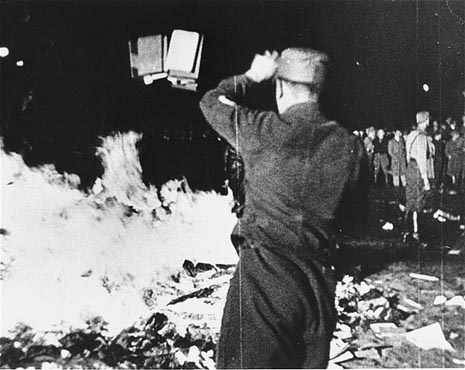
[Image ID: A black and white photo of the May Nazi book burning of the Institute of Sexology's library. A soldier, back facing the camera, is throwing a stack of books into the fire. In the background of the right side, a crowd is watching.]
As the Holocaust went on, the homosexuals of Germany became a targeted group. This did include transgender people, no matter what you say. To deny this reality is Holocaust denial. JK Rowling and everyone else who tries to pretend like this isn't reality is participating in that evil. You're agreeing with the Nazis.
But of course, you knew that already, didn't you?
Edit: Added image IDs. I apologize to those using screen readers for forgetting them. Please reblog this version instead.
#transgender#trans history#transsexual#transphobia#Magnus Hirschfeld#holocaust#holocaust denial#book burning#j.k. rowling#jk rowling#just in case you missed what i mean by all this: go fuck yourself anon :)#trans people have always existed#and we will always exist#if you really wanna pick a fight with me over well-documented history then you better bring in some sources to back your shit#queer history#queer#lgbt+#lgbta+#lgbt#lgbt history#edit: i finally got around to those damn image IDs. i am so very sorry for totally forgetting that's my bimbo moment of the month#also real quick i thought about adding an image of the actual building but the only one i can find has a Nazi parade in front of it#it was taken the day of the book burning raid and honestly if i were to include it then i'd add it to the first few paragraphs#and i think the story's better told when you uphold the hope Magnus Hirschfeld and all the researchers he worked with had#also keeps being brought up: yes Hirschfeld was a eugenicist. it was a popular belief set that was only discredited after WW2#Hirschfeld died in 1935. he literally didn't live long enough to see science turn against those beliefs and practices#considering how he changed his mind on transitions i like to think he would've changed his mind on eugenics too if he'd lived
16K notes
·
View notes
Text
Yes, Greece still exists, we didn't all die 2000 years ago. Yes, people speak Greek. You people are so fucking stupid for real. So many of you claim to love ancient shit but can't even acknowledge the actual living culture of the people whose mythology and classics you romanticize. You keep leaving annoying comments about how you just forget Greek people still exist, thinking you're being quirky because you love ancient stuff soooo much that you forgot about the people it came from. You think about it so little you don't even realize that an actual Greek person has to read this shit, making it clear how little you actually care about the culture beyond the romanticized (and westernized) mythology. Don't claim you love Greece, don't use our mythology anymore if you can't acknowledge that we're still around without making it about how little you think about us. It's mind boggling that you'd think a Greek person would read this and think you're anything but obnoxious. Explode.
#this post is edited because you're all annoying. maybe I'll turn it back someday#it sucks that people can't even be normal about a funny family story once the fact that we're greek comes into the fold#suddenly its all about blorbofied mythology shit and idiots saying ''GREECE IS REAL???? 🤯🤯🤯🤯'' yeah percy j*ckson didnt make it up#maybe it would be less annoying if they weren't all saying it like I'd think it's funny that they don't know we exist instead of like#disturbing on a personal level. like what the fuck#man if you can't acknowledge we exist in real life just name your oc Icarus something else idgaf#so yeah explode. Skase. Voulos'to. Valto mesa sto katamalakismeno mouni tis mana's sou. Psophise. etc.
31K notes
·
View notes
Text
those first couple weeks after escaping a time loop have gotta be disorienting as all fuck. all those little cues that used to tell you what's about to happen are now triggers that cause you to brace for something that isn't coming. you have to relearn the permanence of death -- hell, you have reacquaint yourself with the entire concept of finality altogether. everything keeps changing but it never changes back and you keep having to remind yourself that this is normal. "it won't reset anymore," you echo to yourself, over and over and over, like a broken record, like you're still trapped in a loop, like someone who escaped the time loop but was doomed to bring it into the future with them
#orcspeak#edit: this is not about fanfic nor is it about a specific fanfic nor is it about a specific show or movie or book#this post is about the time loop trope itself which occurs in many different stories spanning many different art forms#i don't read or write fanfic and I'm not looking for fanfic recs and whatever character you think this is about there's#an 80 percent chance i don't recognize their name
48K notes
·
View notes
Text
There's a version of the "don't go grocery shopping while hungry" rule specifically for writers where you should never under any circumstances be allowed to touch your draft within 3 hours of reading a really good story. Because sometimes when you read something great your head goes "fuck this is so much better than my stuff I should make that more like THIS instead!" Look at me. That's the devil talking and you should close the document NOW.
#you will make superficial edits that do not gell well with the rest of your work#and won't actually capture what you thought was so good about that story#close the doc. sit down. think about it for a while. inspiration is fine. getting a 'eureka' moment from another story is fine#but if you find yourself comparing your work one to one with someone else's and taking any differences to be flaws on your part then STOP#you will never write good stuff by trying to make it look less like you wrote it#writing#writing advice#guess who just had to go into her google doc history and undo a bunch of panic-induced edits#because she read a fic about the same characters she's writing for?#meeee. they aged badly within just a few hours of hindsight. learn from my mistakes#self-hatred is not a good motivation for creation#fic writing
10K notes
·
View notes
Text
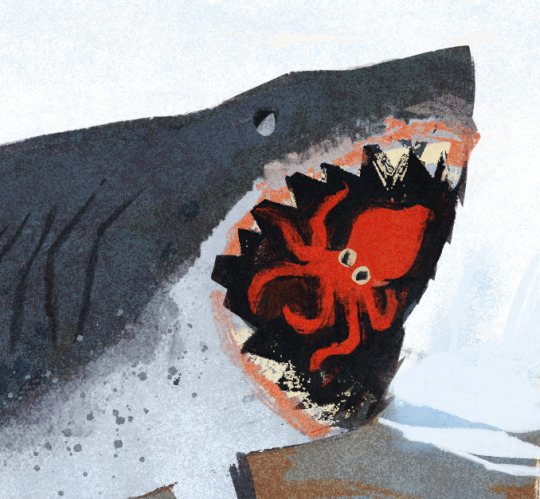
dream wip
#wip#artists on tumblr#flotsam diaries#arrhghhgg happy I got the textures I was aiming for#I was gonna go sleep but eve's song kororon really got me :'D#cough you can see the full image on uh instagram story if you don't wanna wait haha#technically this one's not a wip but wanna draw some others/make it a set#might tweak the octo though#anyways nOW I will sleep#muffled laugh#edit: oh!! thank for you radar tumblr staff :0#but also radar putting my post tag ramblings on bLAST LMAO
13K notes
·
View notes
Text
no, actually, where is the whimsy?
my ex had a best friend named larry who asked me once: what do you think comes after irony?
we were at the bar where larry worked. it was a quiet night, and he'd hopped over to sit with us on the patron side. i swirled the lemon around my limoncello martini.
earnest positivity, i said, while my ex said, art self-destructs.
i stared at my ex. he stared at me.
his argument was the cinemasins argument: look how bad media is becoming! look at the loopholes and the dumb shit!
it was roughly 2011. galaxy print was still in. at the time, i had a favorite shirt that was a wolf howling at the moon. it got ripped in half in the wash and i honestly still mourn it. i dressed like effie stonem, because everyone did. and irony was the name of the thing. men liked MLP "ironically." the internet liked the kind of crass, "anti-mainstream" vibes of things like fuck romance, touch my butt and buy me pizza. we put cats in sunglasses everywhere, which was because we only liked things in irony.
and media had the same vibe in it: anti-hero white men would be "hard to love" and then storm off the scene. nobody was just earnestly trying to save the world: they were jaded, angry, unoriginal. mad you even asked them to try to help.
my ex ends up not being wrong. cinemasins becomes super popular. a lot of people start viewing media with this lens that is the cruelest, most jaded depiction. it's wrong for your character to have unexplained powers, even if the entire movie is about how strange it is she has unexplained powers - that is still considered a "loophole." characters make thoughtless, panicked choices? loophole. characters are actually kind people, despite hardship? loophole. features a woman doing literally anything without assistance? loophole. movies become hyper-aware of scrutiny, and now irony rules the media.
which means you go to a movie, and the character has to turn to the screen and say "beats me!!" or one of the side characters has to have some kind of quip like "are you seriously telling me that you think this is normal?" because nothing can happen in earnest. like a sitcom laugh track, we now anticipate the fourth-wall break: the moment that the media acknowledges it is telling a story. the media has to apologize for itself, or else someone like my ex rolls their eyes.
but here's the thing: i wasn't wrong either.
the difference might be that i am (and always have been) so soft-hearted that any crack in the light of this world will spear me into the ground. and i was the poet in the relationship. (he thought that was the same thing as being naïve and stupid). i was making things daily. i knew how all of us artists are driven by some strange desire to evolve. he notably liked to critique art, not to create it.
so yes, i've made things that are bitter and angry and even ironic. i've made long, sharp poems with all capital letters, and i've made poems about how the silence stretches out like a song. someone wrote once that we will spend our whole lives just circling the place we grew up. i think it's more that we spend our whole lives trying to remake a home. i think it's that as we age, it becomes less exciting to build the castle on the beach - we become aware of erosion, of windforce. we realize what we really want is to come home to our dog, castle or not.
and while art in the foreground is mired in white male violence and irony, and aggression, and not taking anything seriously - i don't think that's true of all art. i think more and more artists are leaning in to the things we love. the world has changed so much. they have taken so many things from us. the only thing we have left is love. at the bottom of the moving box - all we get is the faint sense that we have to appreciate what little we've got. i can't enjoy this stuff ironically anymore: what room do i have for irony? if it makes me happy, that is an amazing thing. there are so few happy places left for me. i want to be happy because of how leaves shiver beside each other like nestling birds. i want to be happy because of the color pink, and how magenta doesn't exist. i have spent so much of this life suffering, i have earned my right to a gentle ending. if nothing matters, i get to assign meaning to the nothing. i get to create meaning. i am an artist first and foremost, which means creation is my thing.
where is the whimsy? wherever i fucking put it. because if this is my last fucking chance to do any good in this world - i want to do it earnestly. i want to write things that make you happy. that make people feel heard and seen. what comes after irony has to be positivity.
it was close to my 21st birthday. in 7 years, i would end up writing a book about this relationship, which is hopefully coming out somewhere around May 2024. i come back to this bar scene in my memories a lot. i keep thinking of how pale my ex was. the look that crossed his face. how i looked back at him. how for a moment, both of us couldn't recognize the other person. like the gulf between us was a suddenly wide and cavernous thing. like we were alien to each other. he never took my opinion seriously, and he always seemed surprised whenever his manic-pixie-dream-girl ever broke free of the plot. like in the whole time we were together, i wasn't human enough.
this knowledge: where he said nothing comes after, my only instinct was what comes after is love.
#spilled ink#writeblr#this is a real story lol#looking back i liked larry as a person SO much more than my ex hollyyyyy shitttt#compulsory heterosexuality will do you DIRTY#edit to correct effies name my apologies to effie and effies family
13K notes
·
View notes
Text
Story Edit Like A Pro!
If you begin a story edit with these questions to evaluate your characters, plot, and setting, you’ll be amazed at how this will help you improve your story!
Evaluating Characters
We’re going to look at characters first.
The cast of characters is the list of characters in your story. These characters act and react. They create emotion. They show motivation. Without any of this, you don’t have a story. That’s a tall order for your characters. So how do you make sure you’re getting the most out of them?
Who appears in each scene?
Having a list of your characters per scene gives a specific method for evaluating how you’re using the characters and shows you when you need to revise a scene.
It’s time to revise a scene if:
There are too many characters in a scene. Is every character required to achieve the purpose of the scene?
An introduced character lacks detail or has too much detail.
There are names that are too similar and might confuse the reader.
What are their goals?
A character goal is what a character wants. She should want it so badly that your readers feel her need in their guts. And failing to achieve the goal will be devastating.
What gets in the way of their goals?
Characters will drive the tension in your story, and tension is what keeps a reader reading. Putting obstacles in the way of achieving the goal will raise the tension.
Evaluating Plot
Plot is what happens in the story. It’s what your story is about. Here are three questions to help you evaluate each scene and how they relate to the plot.
What is the purpose of each scene?
There must always be a reason any given scene exists in your story. That’s what we mean by its purpose. A scene without a purpose will distract the reader from the main story. It may even bore the reader.
Is there an entry hook opening each scene?
Whatever you read at the beginning of the scene that keeps you reading is the scene entry hook. Every scene must have one by the end of the first three paragraphs or so.
Is there an exit hook at the end of each scene?
Whatever you read at the end of the scene that keeps you turning the page to the next scene is the exit hook. Every scene must have an exit hook. This includes a secret revealed, a cliffhanger, a clue, or a story twist.
Evaluating Settings
Finally, while you perform a story edit, examine your settings. Settings are key to keeping your reader engaged, so don’t ignore them.
Is the location you chose the best place for emotional impact?
Each scene must take place somewhere, and each location has the potential to ramp up emotion. Often a writer doesn’t think hard enough about where a scene takes place and doesn’t end up using locations effectively. Does the location elicit emotion in the reader or the characters? If not, choose a different location.
Are there objects relevant to the plot or characterization in each scene?
Watch a film without props or a backdrop, and you’d probably get confused or bored. You’d just be watching actors on an empty stage, which would make it hard to believe the reality they’re trying to portray.
Readers are much more engaged in a story if they can imagine the setting that stirs their emotions.
Are some of the 5 senses used in every scene?
Sensory details keep the “stage” and characters interesting. Without them, both the setting and the characters will seem flat. Using the POV character’s senses to describe the action will bring your reader closer to the character. So ensure the senses used show characterization or move the plot forward.
#writers#creative writing#writing#writing community#writers of tumblr#creative writers#writing inspiration#writeblr#writerblr#writing tips#writblr#novlr#editing#editing resources#editor#writing tools#editing tips#editing advice#story edit#story editing#developmental editing#structural editing#writer resources#writing resource#writing advice#writing help#help for writers#learn to edit#creative writing resources#writing resources
168 notes
·
View notes
Text
The most validating roller-coaster experience is when you suddenly realize you got ahead of your paper edits on-screen and then check back with dread, only to find that you made the exact same changes. Like wow, me and me-from-yesterday are totally on the same page, there were definitely too many adjectives and we both picked the same one to keep. Wow. Good job team. Highest of fives.
0 notes
Text
most annoying breed of author is actually someone who doesn’t respect a genre and sets out to subvert it.
#princess stories and fairytales are especially so susceptible it. I especially hate it when a man decides he can do better and writes a#story that insults the genre as a whole. do not fucking touch the genre please and thank you.#text#edit: if you’re here to check my tags pack it up kids I was ranting about brandon sanderson very tangentially.#but the people saying horror is subjected to the worst of this treatment are right
25K notes
·
View notes
Text
I have a very rough idea in my head that I don't think I can clearly articulate beyond "And that concludes tonight's reports on German air forc—WHAT'S THIS? IT'S KING ARTHUR WITH A STEEL CHAIR"
#writing ideas#though not exactly integral to the story idea it also gets loads funnier if you replace 'King Arthur' with 'Fate Saber'#edit: yes yes I have in fact read That Hideous Strength
35K notes
·
View notes
Text
Senshi is probably the most fandomized character in Dungeon Meshi, and while I don't exactly mind it, I do think he has more depth than that. I find all his little quirks and idiosyncrasies to be fascinating; he's very stubborn and set in his ways about things that seemingly don't matter, he thinks about things that other people don't, he has a deeply set value system that informs everything he does. He cares A Lot, like, this man cares So Much. That's the kind of person you have to be to drop everything to help a random group of adventurers save one woman. But because he feels so strongly about things, he can also be surprisingly immature at times (although he's also the character most likely to admit he was wrong about something). I think part of that is because he's lived in the dungeon on his own so long that he's not used to working with other people. He will extend empathy and friendship to almost anyone, but he does things his own way, and he doesn’t always feel the need to explain his way of thinking because again, he's usually on his own. He's both incredibly wise and kind of childish in ways that seem contradictory at first, but make more and more sense the more we learn about him. Major kudos to Ryoko Kui's writing and pacing to make that transition so seamless and have all those details from his backstory click into place perfectly. And on a wider thematic level, Senshi is kind of a perfect counterpart to characters like Thistle (or any other dungeon lord). Senshi understands the dungeon in ways that even its creator doesn't. Although everyone is scrambling to take control of the dungeon, Senshi is the one who actually takes care of it. He's the one who thinks about things like nutrition and proper sleep and the ecosystem, all those things that it's easy to ignore when you get swept up by the grandeur of it all. He's the most important character to have present in a story that explores life and death and hunger. His constant, invisible presence holds everything together.
#I'm not finished it yet so I don't want to make any big sweeping claims about what his story means in the greater context of the manga#but. I really like him so. Senshi thought dump#I really thought this was going to be shorter...idk if I really got what I wanted to say across but once I started writing I couldn't stop#dungeon meshi#dunmeshi#delicious in dungeon#senshi#senshi of izganda#edit: yeah I should probably tag this#dungeon meshi spoilers#shouldn't I
2K notes
·
View notes
Text
"chilchuck isn't a twink, he's a DILF!" now i get why you're saying that but i feel like you've maybe forgotten what chilchuck tims canonically looks like
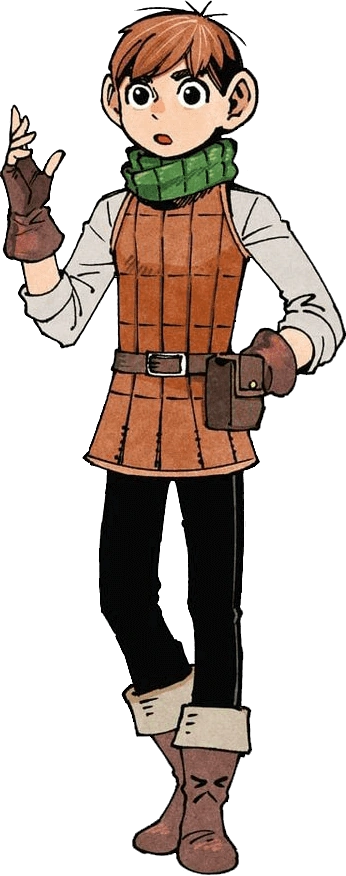
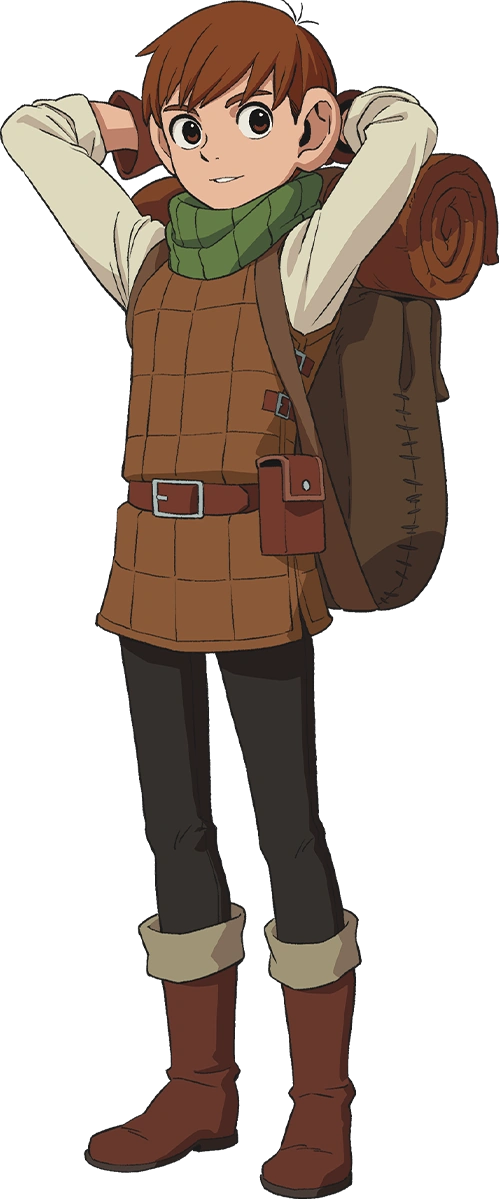
i'm sorry but this man is a twink. also DILF isn't a body type it's a status (and technically, an opinion) so he can be both
"but he's middle-aged!" look at him. look with your eyeballs. his age has nothing to do with the fact that he Looks Like That. he's a twink. the sooner you accept this the less angry his fandom will make you
edit bc this post has become the bane of my existence:
FAQ
Q: wtf do you mean he's a dad? he looks like a kid.
A: he is 29 years old, and a half-foot. half-foots are dungeon meshi's halflings, or hobbits, or whatever you want to call them.
Q: wait, if he's 29, why the fuck are you calling him middle-aged?
A: half-foots have an average lifespan of 50 years. chilchuck was originally drawn with grey hairs (you can see that in the manga fullbody) but the mangaka gave up on that over time. he's middle-aged for his race.
Q: hey, doesn't that look like a little angry face on his boot in the manga drawing?
A: yea kinda
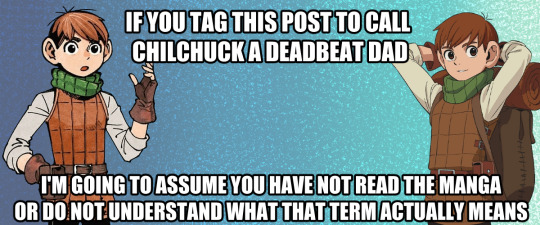
#as a proud member of the chilfucker fandom i think we should all accept his canon appearance even if we draw him way different#if you can only love him if he looks like a hobbit do you really love him at all?#by all means draw and think of him however sparks joy for you. but this is who he is in the manga and anime and you need to accept that#i love all chilchucks but i just love him in general. ideal man#chilchuck tims#tox.txt#edits made because the tags on this post are my villain origin story#i have now muted notifs!
1K notes
·
View notes